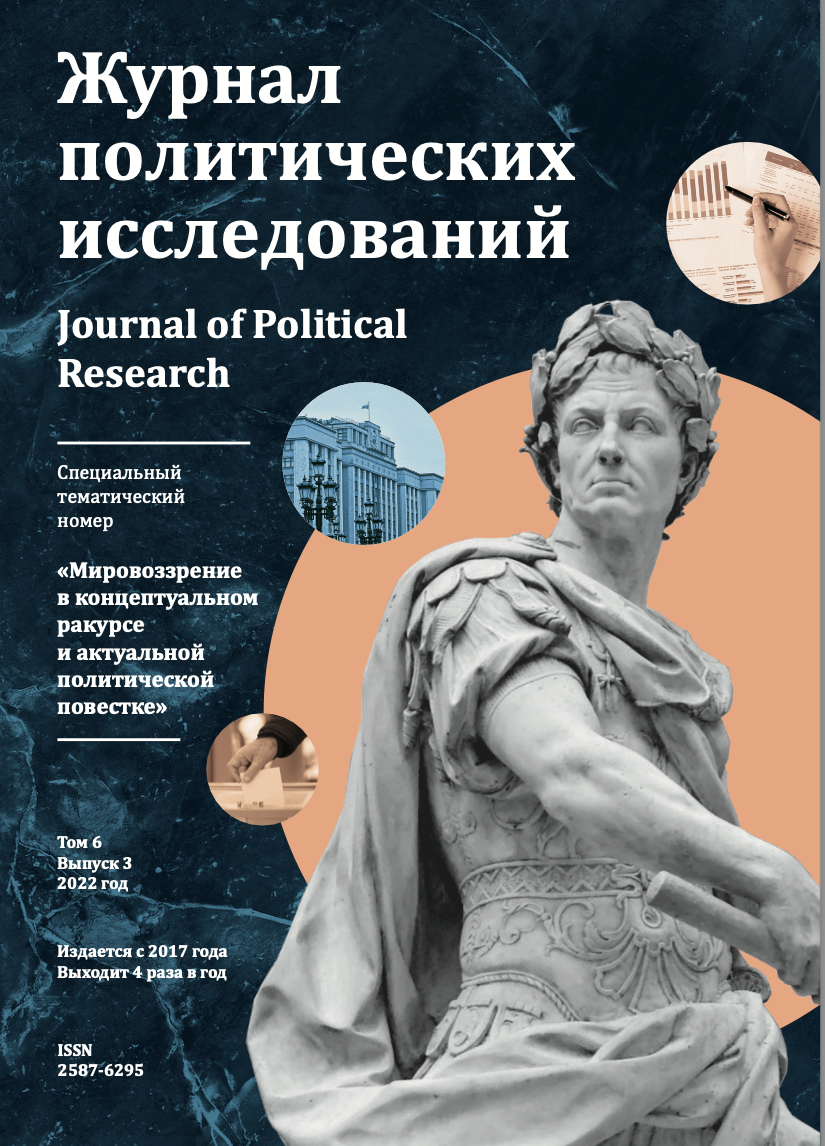Moscow Institute of Physics and Technology (State University) (Humanities & Social Sciences Center, Leading Researcher)
Moscow, Moscow, Russian Federation
Russian Federation
The purpose of this research work is to identify the factors that determine the constructive potential of promoting Bulgarian political parties in the digital environment. To achieve this goal, the article examines the practical experience of using social networks in political campaigns in Bulgaria. At the same time, it is noted that modern digital platforms and social networks are widely used in the country under consideration to communicate with voters in the processes of forming public opinion. To achieve the goal set in the work, the methods of content analysis and discourse analysis of the political segment of the Bulgarian digital space, as well as the Case Study method in the aspect of studying the specifics of the use of digital communication tools by political parties in Bulgaria in the social media space during election campaigns, were used as a methodological basis for the study. Through content analysis, the content parameters of information and communication interaction with the electorate of leading Bulgarian politicians were analyzed in terms of their influence on public opinion. The article examines the cases of information and communication interaction with the electorate of B. Borisov, K. Ninova, R. Radev and H. Ivanov. The paper shows that as a result of the successful application of modern digital technologies of socio-political communication with target electoral audiences, the Citizens for European Development of Bulgaria party demonstrated the ability to effectively interact with voters through the successful introduction of digital technologies during the election campaign, while the Bulgarian Socialist Party, The party "We continue the Changes" and the electoral bloc "Democratic Bulgaria" have demonstrated significantly less effective work with the electorate in the social media space. Based on the results of the work, the authors conclude that digital platforms and social networks are widely used in Bulgaria today for effective socio-political communication with voters and in shaping public opinion of the country's population.
digital communications, election campaigns, political agitation, social media, political parties
1. Belokonev S.Yu., Vasiliev M.S., Titov V.V. Tsifrovye tehnologii v sovremennykh izbiratel’nykh kampaniyakh: osobennosti primeneniya [Digital technologies in modern election campaigns: application features]. Vlast [Government]. 2019, V. 78, I. 4, pp. 51-57. (In Russian). DOI: https://doi.org/10.31171/vlast.v27i4.6585; EDN: https://elibrary.ru/LGSGRL
2. Brodovskaya E.V. Tsifrovoy menedzhment v deyatel’nosti rossiyskikh politicheskikh partiy: problemnoe pole upravleniya informatsionnymi potokami v sovremennykh mediya [Digital management in the activities of Russian political parties: the problematic field of information flow management in modern media]. Vlast [Government]. 2020, V. 28, I. 6, pp. 81-88. (In Russian). DOI: https://doi.org/10.31171/vlast.v28i6.7727; EDN: https://elibrary.ru/XVFRBA
3. Brodovskaya E.V., Yezhov D.A., Ognev A.S. Internet-kommunikatsii rossiyskikh politicheskikh patriy v tekush’em izbiratel’nom tsikle: resul’taty okulometricheskogo analiza setevogo kontenta [Internet communications of Russian political parties in the current election cycle: results of oculometric analysis of network content]. Political Science. 2021, I. 3, pp. 112-141. (In Russian). DOI: https://doi.org/10.31249/poln/2021.03.05; EDN: https://elibrary.ru/GTYLYP
4. Volodenkov S. V. Internet- tehnologii kak sovremennyy instrument virtualizatsii massovoy politicheskoy real’nosti [Internet technologies as a modern tool for virtualization of mass political reality]. Vestnik Moskovskogo universiteta. Seriya 12: Politicheskie nauki. [Bulletin of Moscow University. Series 12: Politic Sciences]. 2017, I. 2, pp. 15-23. (In Russian). EDN: https://elibrary.ru/ZRKNOF
5. Volodenkov S. V., Fedorchenko S. N., Artamonova Yu.D. Sotsiotekhnicheskaya real’nost’ tsifrovogo prostranstva sovremennoy politiki: struktura i osobennosti [Sociotechnical reality of the digital space of modern politics: structure and features]. Politicheskaya ehkspertiza: POLITEHKS [Political Expertise: POLITEX]. 2022, V. 18, I. 3, pp. 230-253. (In Russian).
6. Kosorukov A.A. Algoritmy poiskovykh mashin I sotsial’nykh setey kak factor stanovleniya tsifrovoy publichnoy sfery [Algorithms of search engines and social networks as a factor in the formation of the digital public sphere]. Politics and Society. 2018, I. 2, pp. 23-31. DOI:https://doi.org/10.7256/2454-0684.2018.2.24734. (In Russian). EDN: https://elibrary.ru/YRPDWE
7. Krastev I., Xolms S. Svet, obmanuvshij nadezhdy`. Pochemu Zapad proigry`vaet bor`bu za demokratiyu [The light that disappointed hopes. Why the West is losing the fight for democracy]. Moscow, Al`pina Didzhital, 2020, 380 p. (In Russian).
8. Maltseva A.A. Golos Levitana kak opora dlya sovetskogo Naroda na puti k Velikoy Pobede [The voice of Levitan as a support for the Soviet people on the way to the Great Victory]. Velikaya Otechestvennaya voyna v pamyati pokoleniy [The Great Patriotic War in the memory of generations]. Stary Oskol: ROSA, 2020, pp. 44-48. (In Russian). EDN: https://elibrary.ru/OGPJHO
9. Sakharov N.A. Presidentskie vybory v SSHA [Presidential elections in the USA 1960]. 2022. Available at: https://bigenc.ru/c/prezidentskie-vybory-v-ssha-1960-0b6de0 (Accessed: 20.09.2023). (In Russian).
10. Skandal vokrug Cambridge Analytica – pochemu eto vazhno dlya nas? [The Cambridge Analytica scandal – why is this important to us?] Available at: https://www.imemo.ru/news/events/text/cambridge-analytica-scandal-why-is-it-important-for-us (Accessed: 20.09.2023). (In Russian).
11. Fedorchenko S.N. Vlast’ algoritma: tekhnologii legitimatsii politicheskikh rezhimov v usloviyakh tsifrivizatsii [The power of the algorithm: technologies of legitimization of political regimes in the context of digitalization]. Moscow: Prospekt [Avenue]. 2023, 480 p. (In Russian). EDN: https://elibrary.ru/ZERJUS
12. Schmidt E., Cohen D. The new digital world. How technology is changing people's lives, business models and the concept of states. 2013. 368 p.
13. Yarulin I.F., Pozdnyakov E.I. Mirovozzrencheskiy raskol v Evrope [The ideological split in Europe]. Zhurnal politicheskih issledovanij [Journal of Political Research]. 2021, V. 5, I. 1, pp. 133-149. (In Russian). DOI: https://doi.org/10.12737/2587-6295-2021-5-1-133-149; EDN: https://elibrary.ru/QDANZP






















